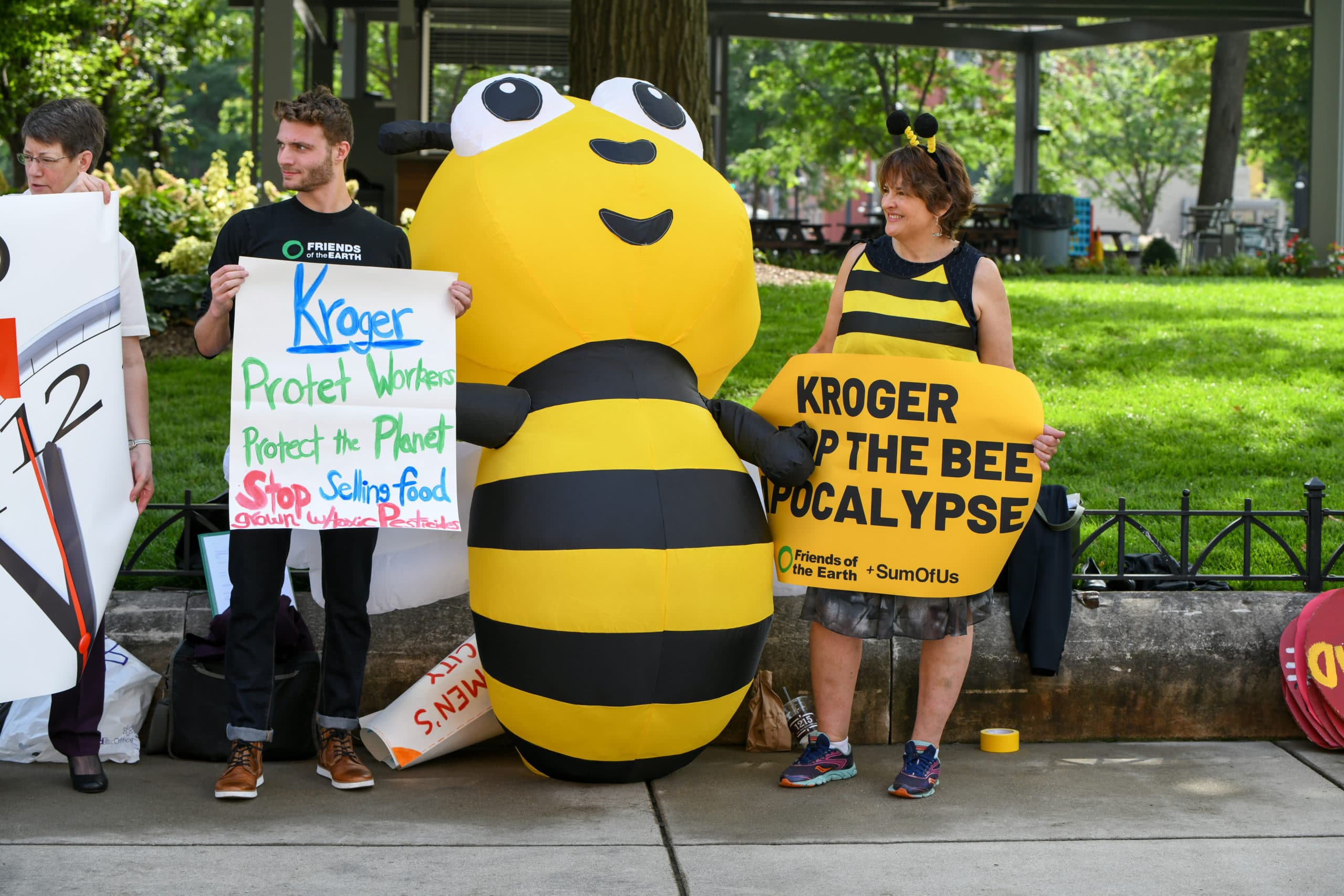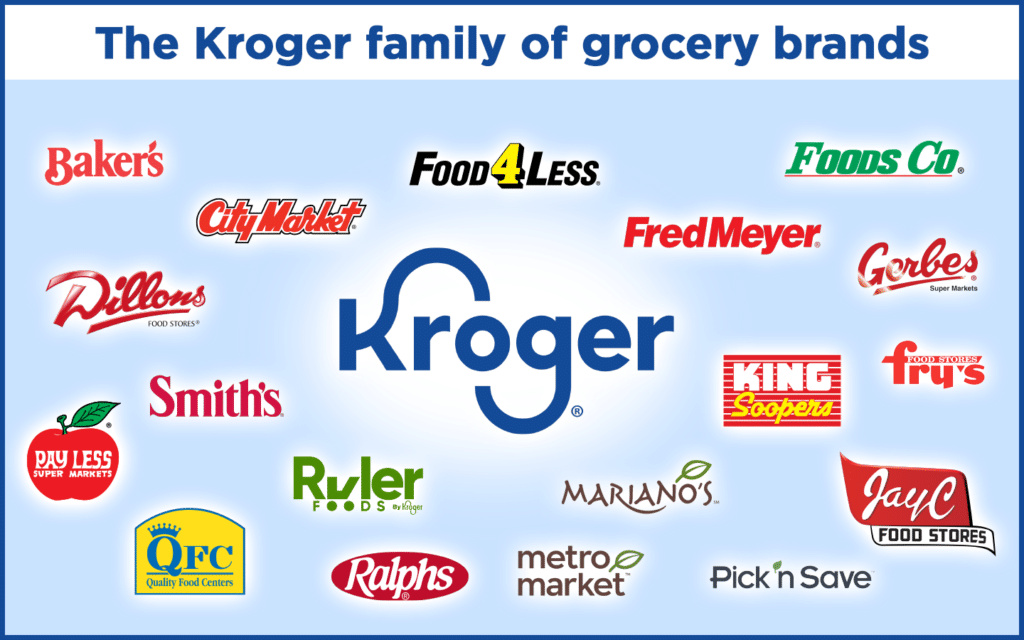
It’s time for Kroger to do better by the bees.
Have you ever walked into your favorite grocery store only to see some of your favorite foods missing in the produce section? Unfortunately, this could become commonplace if we don’t end the use of toxic pesticides in our food system. Scientists warn that many pollinators and other insects could go extinct within a century and that this “insect apocalypse” could create a major collapse in our ecosystems.
Friends of the Earth and our allies are leading a campaign to push the largest U.S. grocery retailers to save the bees and other beneficial insects that help farmers grow food by ending the use of pollinator-toxic pesticides in their supply chains and by increasing bee-friendly organic offerings. Not only is this necessary for our future food security, it’s critical to grocery retailers’ bottom line. Without pollinators, grocery stores will run short of a wide assortment of fruits, vegetables, nuts, beans, and delicious favorites like chocolate and coffee. And because bees pollinate crops eaten by cows, even the dairy and meat aisles would look bare. In fact, 71 of the 100 crops that provide 90 percent of the world’s food are pollinated by bees.
So, why target Kroger?
Kroger is the largest traditional grocery chain in the U.S. You may think there’s not a Kroger in your area, but there most likely is! Kroger has nearly 2,800 stores in 35 states operating under many different names (see image below). Kroger could use its purchasing power to save the bees. As a grocery giant that controls in $137.9 billion in food and beverage sales, reaching consumers from coast to coast, Kroger must step up before it’s too late.

That’s why, in our campaign, we’ve asked the retailer to stop selling food grown with pesticides that kill bees. The good news is Kroger took an important first step and established a pollinator health policy in 2019. However, the policy didn’t set any measurable targets to reduce pesticides or expand organic and other ecological farming methods in Kroger’s supply chain. The company hadn’t taken further action since.
So, we increased pressure on Kroger this year. We’re glad to say that at the company’s shareholder meeting in June, the CEO, Rodney McMullen announced that Kroger “pledge[s] to develop a new comprehensive sustainable agriculture commitment for our produce supply chain.” That’s great news, but we need to keep the pressure on to ensure that Kroger takes meaningful action.
Kroger is falling out of step with the times. This year, the grocery store chain received a dismal D- grade and dropped to 14th place on the Bee-Friendly Retailer Scorecard, where we grade 25 of the largest U.S. food retailers on protecting pollinators from pesticides. Kroger is falling far behind competitors like Costco, Albertsons, and even Dollar Tree. Kroger could follow the lead of companies like Giant Eagle and Walmart, which recently made timebound commitments to protect pollinators. Giant Eagle will eliminate the most concerning bee-toxic neonicotinoid pesticides — imidacloprid, clothianidin, thiamethoxam and dinotefuran — in its produce supply by 2025. These chemicals have been banned in the European Union but are still allowed in the U.S. Giant Eagle and Walmart will require produce growers to start using ecological farming methods known as integrated pest management (IPM) by 2025 and to prove it with third party certification.
Many of the same pesticides in Kroger’s supply chain that threaten bees are also linked to harm human health. Independent testing found that Kroger store-brand foods are contaminated with pesticide residues, including glyphosate, organophosphates, and neonicotinoids. The tested foods include those that kids and families typically eat, like cereal, apples, applesauce, spinach, and pinto beans.
Fortunately, there is hope. Science shows that eating organic food dramatically reduces exposure to the pesticides in food, and it also helps bees and other beneficial insects flourish. Organic farmers are prohibited from using over 900 pesticides otherwise allowed in agriculture. Instead, they work with nature to keep crops healthy and manage pests.
Furthermore, we’re seeing more and more people like you urging stores like Kroger to protect bees and other pollinators. You aren’t alone: according to recent polling, 74% of Americans believe that grocery stores should support efforts to protect pollinators, and 83% believe it is important to eliminate pesticides that are harmful to pollinators from agriculture. Kroger needs to hear from people across the country that we want change. Together, we can create a healthier food system for pollinators, for our environment, and for our families.
We can’t let another year pass with Kroger not doing anything to protect the pollinators that our food supply depends on! Let’s ramp up the pressure! Take action now!
To learn more about Kroger and the other companies ranked on the Bee-Friendly Retailer Scorecard, visit www.BeeAction.org.
Related Posts
Ways to Support Our Work

Read Latest News
Stay informed and inspired. Read our latest press releases to see how we’re making a difference for the planet.

See Our Impact
See the real wins your support made possible. Read about the campaign wins we’ve fought for and won together.

Donate Today
Help power change. It takes support from environmental champions like you to build a more healthy and just world.